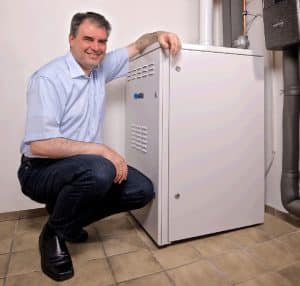On Aug. 1, 2016, the heating industry got the certainty they wanted with regard to the future policy framework for state-of-the-art fuel cell heating systems: The German Federal Ministry for Economic Affairs and Energy (BMWi) announced two new subsidy programs, one providing an investment grant for fuel cell heating systems and one for optimizing heating technology by replacing old pumps. Both financial measures are part of the Incentive Program Energy Efficiency (APEE), which will run until 2018, and are thought to advance the transformation of the energy market from inside the boiler room.
The fuel cell industry had been waiting a long time for this day, but it finally arrived: In summer, the EU Commission approved the subsidy programs, so that the implementation of new heating technology could still start ahead of this year’s heating season. Erik Schumacher, head of the Stationary Fuel Cells division at NOW, told H2-international: “We are pleased that the EU notification came so quickly.” Just in time for the establishment of the financial framework, numerous heating companies had previously announced to have their fuel cell devices on the market this fall (see table 1 & 2).
Detailed table with specifications of all fuel cell heatings systems offered in Germany: Table 1 & Table 2
(only for e-journal subscribers in high resolution)
Subsidizing residential buildings
Homeowners can now receive an investment subsidy of 40% of the eligible costs when buying a fuel cell heating unit for newbuilds or during the energy-efficient renovation of existing building stock. Applications are to be submitted to the KfW Development Bank through the program Energy-Efficient Construction and Refurbishment – Fuel Cell Grant with the number 433 (www.kfw.de/433). The base grant is EUR 5,700 plus a performance-based amount of EUR 450 per 100 Wel or part thereof (by performance rating: 0.25 to 5 kWel; can be combined with CHP Act subsidies; see Financial Support for Efficient Heating Systems). The owner of a 1 kW unit could thus benefit from a total of EUR 10,200 in investment grants.
The Mechanical Engineering Industry Association (VDMA) has meanwhile criticized the restriction placed on applicants: Only natural persons are allowed to apply for grants, which means that organizations owning residential or commercial properties are currently excluded from the benefits. Johannes Schiel, director of VDMA Fuel Cells, told H2-international: “We support the inclusion of other properties such as commercial real estate and multi-family buildings, and of SMEs and contracting companies. We have entered into a constructive dialog with the BMWi about the topic and hope that the ministry considers our suggestions and aims for a swift improvement of the program.”
Incentive Program Energy Efficiency
The German economy ministry‘s APEE received notification from the EU Commission at the end of July 2016. The first two components of it were the heating and ventilation package, which were launched on Jan. 1, 2016. They were followed in mid-May 2016 by the efficiency initiative “Deutschland macht’s effizient” (“Germany shows how to be efficient”). The support of fuel cell heating systems is the last component of APEE, which will run until 2018 with a budget of EUR 165 million a year. The heating industry, however, had hoped that in order to get 150,000 units sold, the market deployment of fuel cell heating systems alone would have been supported with EUR 350 to 666 million over a period of eight years.
Said Gabriel: “By subsidizing fuel cell heating systems, we intend to establish a new and forward-looking technology on the market with as much support as possible.” Timm Kehler, chair of Zukunft Erdgas, explained: “The technology represents the most efficient form of combined heat and power. […] It not only guarantees low costs of consumption, but also sets new benchmarks in terms of efficiency and CO2 emissions.“
NOW chair Klaus Bonhoff had already announced during the Hanover trade show in April 2016 that with the introduction of the Technology Rollout Program (TEP), there would still be a program this year to ensure the coverage of “today’s differential cost between fuel cell heating systems and conventional ones.” However, Frank Heidrich from the federal economic ministry remarked that quality assurance would require appropriate maintenance: “The installer has to offer a ten-year maintenance contract. Otherwise, there won’t be any funding.”
Energy-efficient pump technology
The second subsidy program covers 30 percent of the building owner’s net investment cost when replacing old heating technology with highly efficient pumps. As the BMWi explained: “By 2020, two million pumps are to be replaced per year and 200,000 hydraulic calibrations performed, saving around 1.8 million tons of CO2 emissions.” The measure – embedded in the efficiency initiative of the BMWi – will be managed by BAFA.



























0 Comments